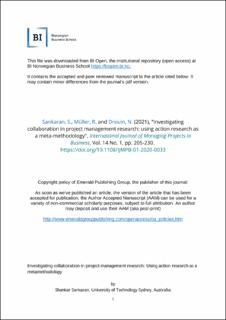| dc.description.abstract | Purpose
The purpose of this article is to investigate collaboration in project management research. Although the literature shows an increase in collaboration between scientists and social scientists for various reasons, it is unclear how and why such collaboration takes place in project management research. The literature does show that co-authorship of articles published in project management journals is on the rise due to increased collaboration between researchers in developed countries and emerging economies as well as developing countries. However, no detailed study has been conducted to investigate how such collaboration occurs in practice in project management research. This article addresses this gap.
Design/methodology/approach
We use a multi-method approach (action research as a meta-methodology and surveys) using qualitative data to reflect on a successful collaborative externally funded research project. At the end of the study, a survey was used to investigate how collaboration occurred among the 26 researchers involved, who were spread over nine countries to collect data on a sponsored research project led by the authors who were the principal investigators. We also compare our findings from the original project with findings from a second survey of a purposeful sample of ten project management researchers who have conducted or are conducting collaborative research in order to validate our findings.
Findings
Through this study, we were able to compare the reasons for increased collaboration in scientific research reported in the literature with what we learnt from our own experience in collaborating on a large-scale project across geographical boundaries and cultures around the world. We were also able to get some insights on enablers and barriers to collaboration from peers who have collaborated on project management research from the second survey. We found that, although some of the reasons explained in the literature were confirmed in our study (e.g. the reputation of lead researchers), some other reasons (e.g. the prestige of institutions) were not that important. The conclusions section of this article provides a more detailed comparison. We also found that using a project management approach would deliver better outcomes. The literature on scientific collaboration was divided on the value of a project management approach and preferred a combination of firmness and flexibility. We found that using action research as a meta-methodology to reflect on our research gave us further insights into why we did what we did at certain critical points in our research that moved us forward.
Research limitations/implications
Our study used two surveys with a limited number of researchers to compare what was found in the literature on reasons for collaboration in scientific research and how research outcomes were measured using citation rates. Conducting interviews or focused groups could have provided more nuanced findings. However, our findings did show that collaboration is beneficial to both experienced and early career researchers and helps them to publish in higher-ranked journals resulting in better visibility for the research. This is an interesting observation and merits further investigation. Theoretical implications: Findings from this research contribute to the broad literature on collaborative research in science and social science with a focus on practice-based fields such as project management where collaboration between academics and practitioners is becoming important.
Practical implications
The study provides some insights into the reasons for processes used and benefits from collaboration in project management research. Our findings have also been validated with our peers. Thus, this study will be useful for setting up and managing collaborative research in project management.
Social implications
Effective collaboration in research can provide social value through mentoring of early career researchers.
Originality/value
This is the first detailed study of collaborative research in project management. It also proposes an action research model that can be used to retrospectively analyse long-term research projects to reflect upon and improve. | en_US |
